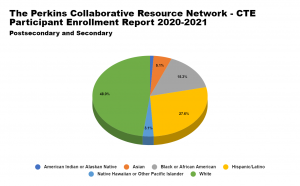NYSACTE, Advance CTE, and ECMC Foundation are excited to introduce the Fellows of the inaugural cohort of emerging leaders from across New York State. The Fellows of the NYSACTE Postsecondary State Career Technical Education (CTE) Leaders Fellowship at Advance CTE—Sponsored by ECMC Foundation include representation across multiple demographic categories reflecting the Fellowship’s goal of intentionally building a postsecondary leadership pipeline for underserved populations in CTE that closes racial representation gaps and removes equity barriers to postsecondary leadership advancement. This final blog in the series introduces the remaining five NYSACTE Fellows.
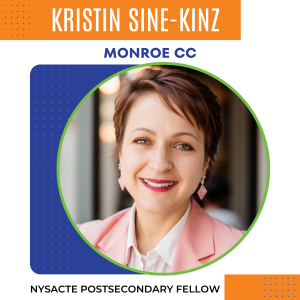 Kristin Sine-Kinz, MBA, serves as the chief of staff and strategic marketing team leader for the Division of Economic & Workforce Development & Career Technical Education at Monroe Community College (MCC). Ms. Sine-Kinz has a rich background in professional services, having crafted business and marketing strategies for major brands like Motorola, Fisher Price, Kodak, and Honeywell. At MCC, Ms. Sine-Kinz reports to the division Vice President, and is deeply involved in strategic projects and initiatives, both college-wide and within her division. Her extensive 27-year career includes nearly 13 years at MCC, and a stint as the MCC Interim Vice President for Economic & Workforce Development & Career Technical Education. She holds an MBA from Western Governors University and a Bachelor of Fine Arts from the Rochester Institute of Technology.
Kristin Sine-Kinz, MBA, serves as the chief of staff and strategic marketing team leader for the Division of Economic & Workforce Development & Career Technical Education at Monroe Community College (MCC). Ms. Sine-Kinz has a rich background in professional services, having crafted business and marketing strategies for major brands like Motorola, Fisher Price, Kodak, and Honeywell. At MCC, Ms. Sine-Kinz reports to the division Vice President, and is deeply involved in strategic projects and initiatives, both college-wide and within her division. Her extensive 27-year career includes nearly 13 years at MCC, and a stint as the MCC Interim Vice President for Economic & Workforce Development & Career Technical Education. She holds an MBA from Western Governors University and a Bachelor of Fine Arts from the Rochester Institute of Technology.
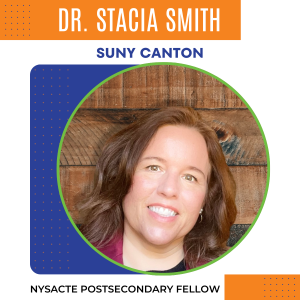 Dr. Stacia Smith is an assistant professor in the Decision and Graphic Media Systems Department at SUNY Canton. She has been teaching computing and technology courses since 2009. Dr. Smith spent 12 years as the principal investigator for the Collegiate Science and Technology Entry Program (CSTEP), a New York State grant-funded program. In this position, Dr. Smith provided education assistance and academic enrichment services to minorities and economically disadvantaged students pursuing careers in STEM, health, or a licensed profession. She currently serves as chair of the Women in Engineering committee and is a member of the campus’s Affirmative Action committee. Dr. Smith is an experienced grant writer; she has secured over one million dollars in funding for her campus. Dr. Smith has a doctorate degree from Purdue University, a master’s degree from SUNY Potsdam, and a bachelor’s and associate degrees from SUNY Canton.
Dr. Stacia Smith is an assistant professor in the Decision and Graphic Media Systems Department at SUNY Canton. She has been teaching computing and technology courses since 2009. Dr. Smith spent 12 years as the principal investigator for the Collegiate Science and Technology Entry Program (CSTEP), a New York State grant-funded program. In this position, Dr. Smith provided education assistance and academic enrichment services to minorities and economically disadvantaged students pursuing careers in STEM, health, or a licensed profession. She currently serves as chair of the Women in Engineering committee and is a member of the campus’s Affirmative Action committee. Dr. Smith is an experienced grant writer; she has secured over one million dollars in funding for her campus. Dr. Smith has a doctorate degree from Purdue University, a master’s degree from SUNY Potsdam, and a bachelor’s and associate degrees from SUNY Canton.
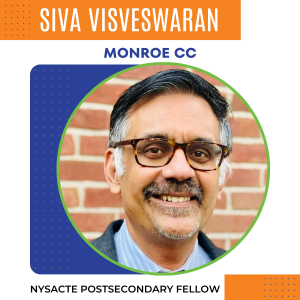 Siva Visveswaran serves as director of the Finger Lakes Workforce Development Center (FWD), which helps to drive the operations strategy and implementation of accelerated training programs and career exploration opportunities in the areas of Advanced Manufacturing, Skilled Trades, and IT. Through innovative partnerships across area employers, economic development nonprofits, community-based organizations and local colleges and schools, the FWD center aims to address critical skill gaps and labor shortages for the Finger Lakes region.
Siva Visveswaran serves as director of the Finger Lakes Workforce Development Center (FWD), which helps to drive the operations strategy and implementation of accelerated training programs and career exploration opportunities in the areas of Advanced Manufacturing, Skilled Trades, and IT. Through innovative partnerships across area employers, economic development nonprofits, community-based organizations and local colleges and schools, the FWD center aims to address critical skill gaps and labor shortages for the Finger Lakes region.
Co-founding Topxight Labs LLC to incubate emerging businesses at the confluence of product design, commerce, machine learning, and data sciences. With a special focus in FinTech and EdTech and technology adoption in emerging markets. Responsible for defining Topxight’s thematic focus areas, its proprietary start-up incubation methodology called Survey-To-Scale, technology strategy for portfolio companies, industry and academia engagement, IP creation and authoring position papers. Companies incubated include: Alphabeta, Manoké, Cythereal, L4S, FlyBy, and GreenCoin.
More than 25 years of experience in the IT industry as software developer, system engineer, enterprise architect and IT strategy consultant. Strengths & experience in incubating emerging technology organizations, developing business aligned IT strategies and building strong software engineering teams.
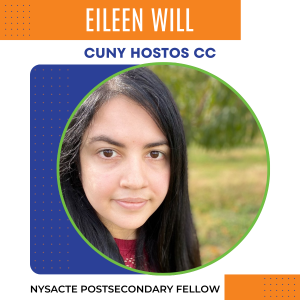 Eileen Will holds a Master of Public Administration (MPA) from Baruch College and a Bachelor of Arts (BA) from City College. She is currently in her third year as Perkins director at Hostos Community College in the South Bronx, where she is dedicated to advancing the success of students in Career and Technical Education (CTE) programs.
Eileen Will holds a Master of Public Administration (MPA) from Baruch College and a Bachelor of Arts (BA) from City College. She is currently in her third year as Perkins director at Hostos Community College in the South Bronx, where she is dedicated to advancing the success of students in Career and Technical Education (CTE) programs.
Eileen’s career began in social services, working with special populations, and has evolved into a strong focus on program development and community outreach. She has built a solid foundation in creating impactful initiatives that enhance access to education and resources.
Passionate about fostering pathways to success for CTE students, Eileen is committed to improving opportunities for all learners. She was honored with the Hostos Community College Manos a la Obra Award in 2023 for her outstanding management of the Perkins grant, and in 2024, she was selected for the ACTE NextLevel Postsecondary CTE Leadership Program.
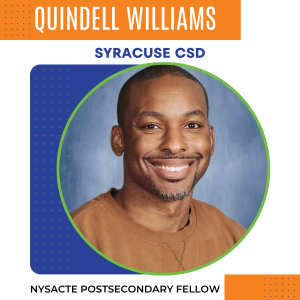 Quindell Williams is currently the workforce talent and development coach for the Career and Technical Education Department, in the Syracuse City School District. Prior to this role, Quindell spent a few years teaching the PTECH Remotely Piloted Aircraft Systems (RPAS) program to high school students. Through his passion for mentorship and drone technology, Quindell has enjoyed helping students reach their potential in the classroom.
Quindell Williams is currently the workforce talent and development coach for the Career and Technical Education Department, in the Syracuse City School District. Prior to this role, Quindell spent a few years teaching the PTECH Remotely Piloted Aircraft Systems (RPAS) program to high school students. Through his passion for mentorship and drone technology, Quindell has enjoyed helping students reach their potential in the classroom.
Before becoming an Educator in CTE, Quindell spent nearly 10 years in Broadcast Television at CNY Central in Syracuse, as a videographer and drone pilot. He is a proud graduate of Onondaga Community College and SUNY Oswego.
To learn more about the NYSACTE Fellowship please visit https://www.acteonline.org/nysacte/nysacte-postsecondary-fellowship/.


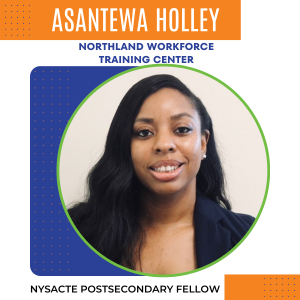 Asantewa K. Holley
Asantewa K. Holley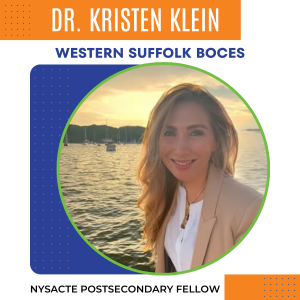 Dr. Kristen Klein
Dr. Kristen Klein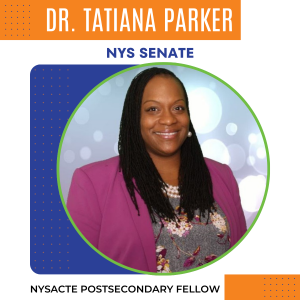 As the Director of Constituent Services and Grant Administrator for a New York State Senator in Central New York,
As the Director of Constituent Services and Grant Administrator for a New York State Senator in Central New York, 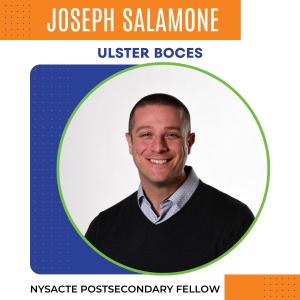 Joe Salamone
Joe Salamone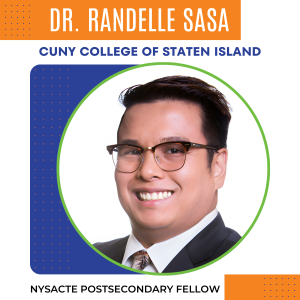 Dr. Randelle Sasa
Dr. Randelle Sasa Dana Acee
Dana Acee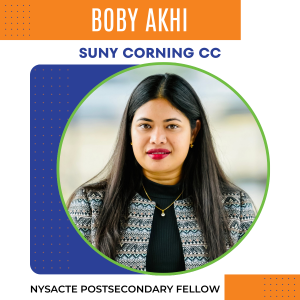 Boby Akhi
Boby Akhi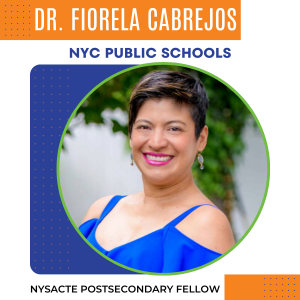 Dr. Fiorella Cabrejos
Dr. Fiorella Cabrejos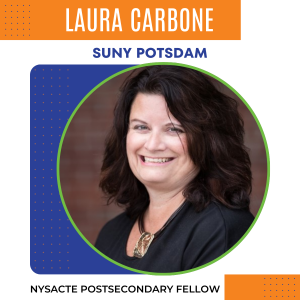 Laura Carbone
Laura Carbone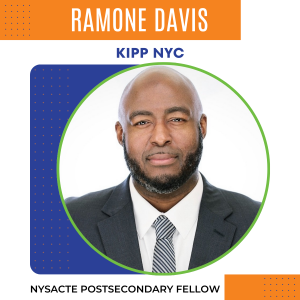 Ramone Davis
Ramone Davis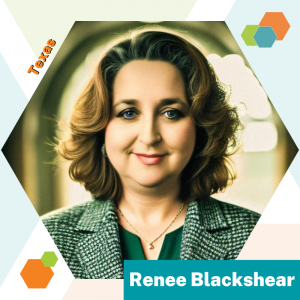 A: Growing up, my family faced financial challenges, which made me acutely aware of the need for stable, well-paying jobs. For a while, I dreamt of becoming a journalist, but I quickly realized that CTE offered real, hands-on opportunities to build a sustainable career. What drew me to CTE wasn’t just financial stability; it was the chance to provide others, especially those from underserved communities, with the skills they need to succeed in today’s job market.
A: Growing up, my family faced financial challenges, which made me acutely aware of the need for stable, well-paying jobs. For a while, I dreamt of becoming a journalist, but I quickly realized that CTE offered real, hands-on opportunities to build a sustainable career. What drew me to CTE wasn’t just financial stability; it was the chance to provide others, especially those from underserved communities, with the skills they need to succeed in today’s job market.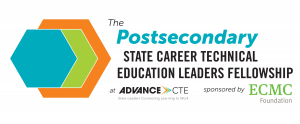

 Preparations are underway for Advance CTE’s 2024 Fall Meeting in Phoenix, AZ, October 21-23! Visit the
Preparations are underway for Advance CTE’s 2024 Fall Meeting in Phoenix, AZ, October 21-23! Visit the  Administration of a CTE program with an equity lens begins with ensuring all learners have meaningful access to and substantial engagement in high-quality CTE programming which requires making these actions a priority. Ohio has created and applied equity-minded leadership principles within
Administration of a CTE program with an equity lens begins with ensuring all learners have meaningful access to and substantial engagement in high-quality CTE programming which requires making these actions a priority. Ohio has created and applied equity-minded leadership principles within  The application of equity-minded principles isn’t a one-time occurrence. It requires an ongoing systematic review of policies, practices and data to determine the effectiveness of the mitigating or transformational strategies being applied. Indiana engaged in this process by conducting a review of the CTE equity labs being offered in their state and using additional resources to measure goal attainment and to provide additional supports to local leaders.
The application of equity-minded principles isn’t a one-time occurrence. It requires an ongoing systematic review of policies, practices and data to determine the effectiveness of the mitigating or transformational strategies being applied. Indiana engaged in this process by conducting a review of the CTE equity labs being offered in their state and using additional resources to measure goal attainment and to provide additional supports to local leaders. 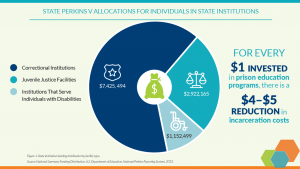
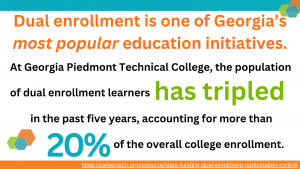
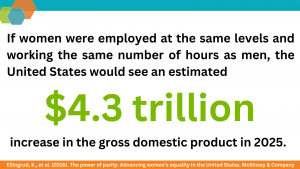
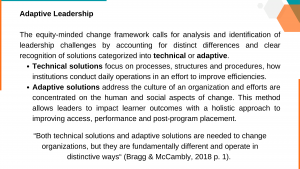
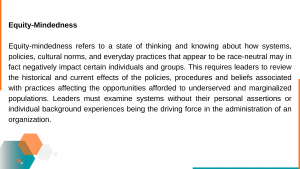
 Pennsylvania
Pennsylvania Texas
Texas Ohio
Ohio